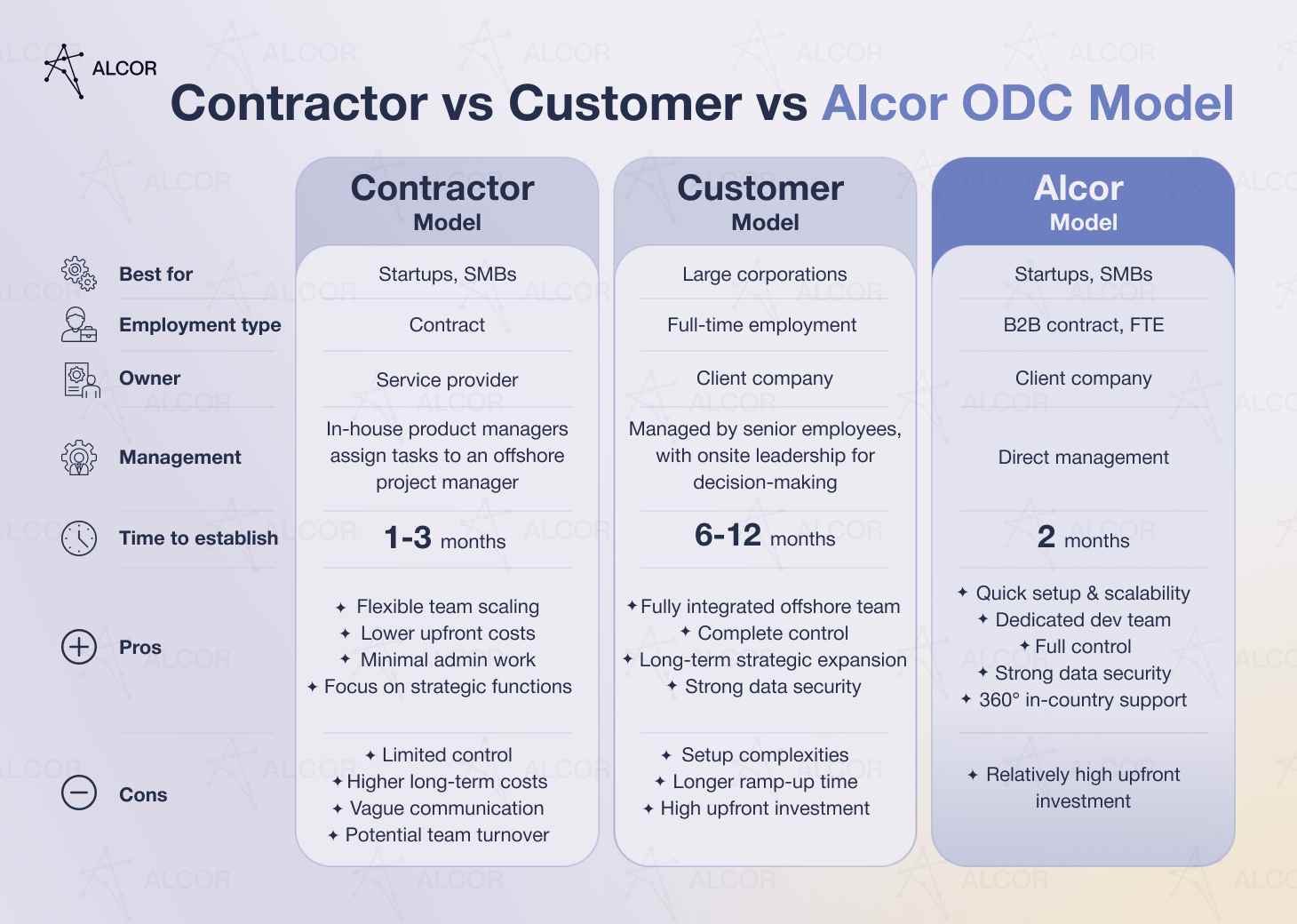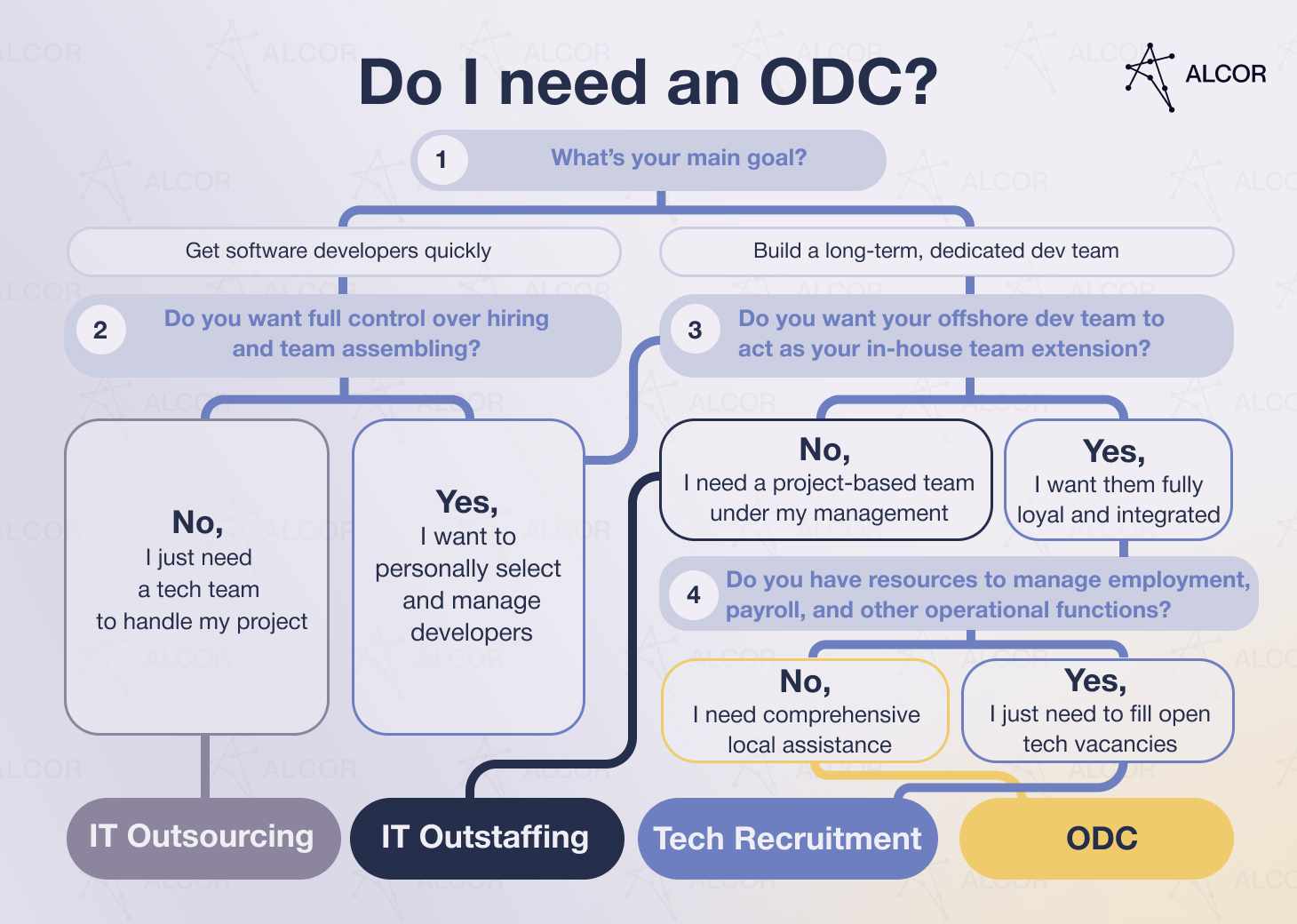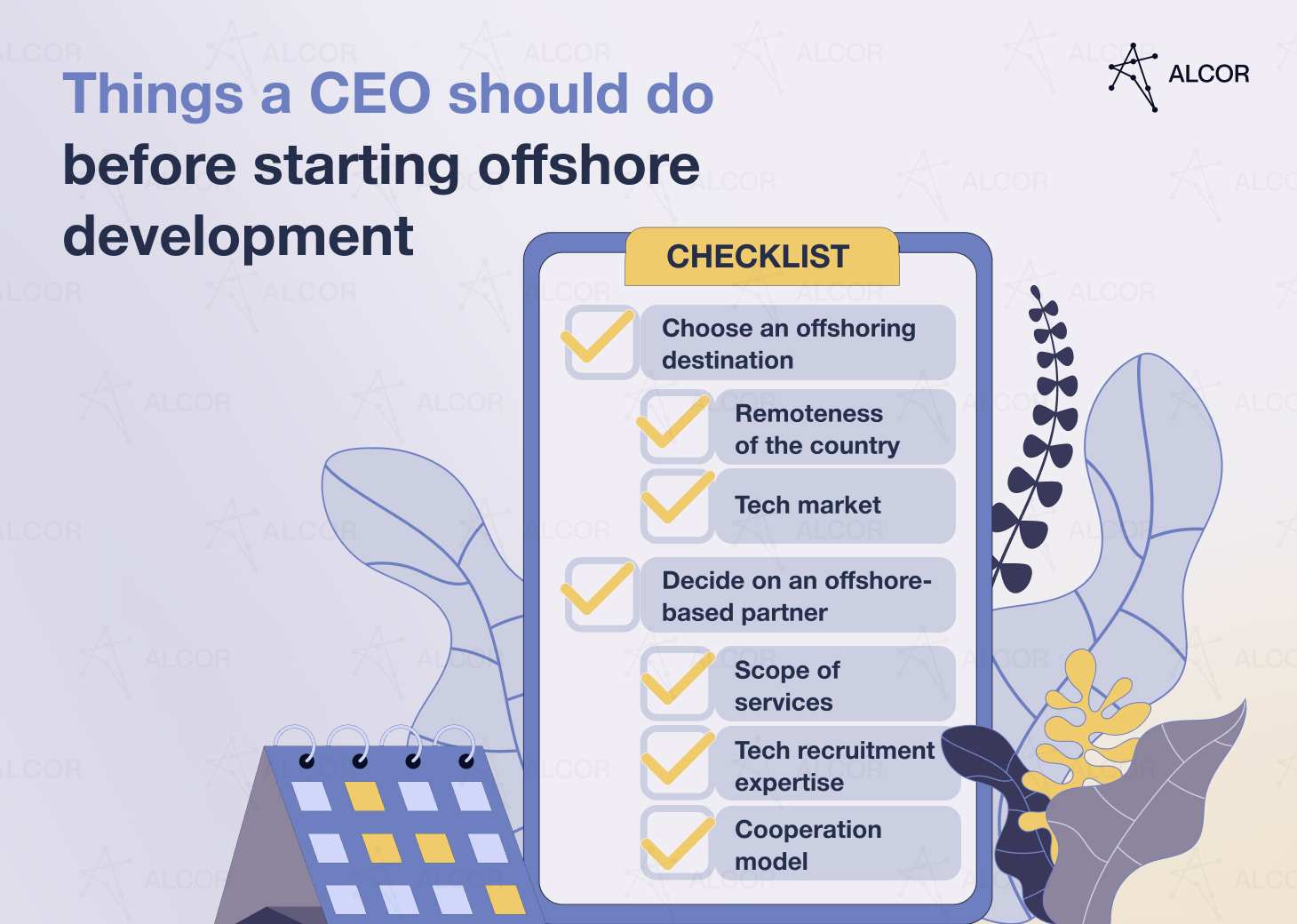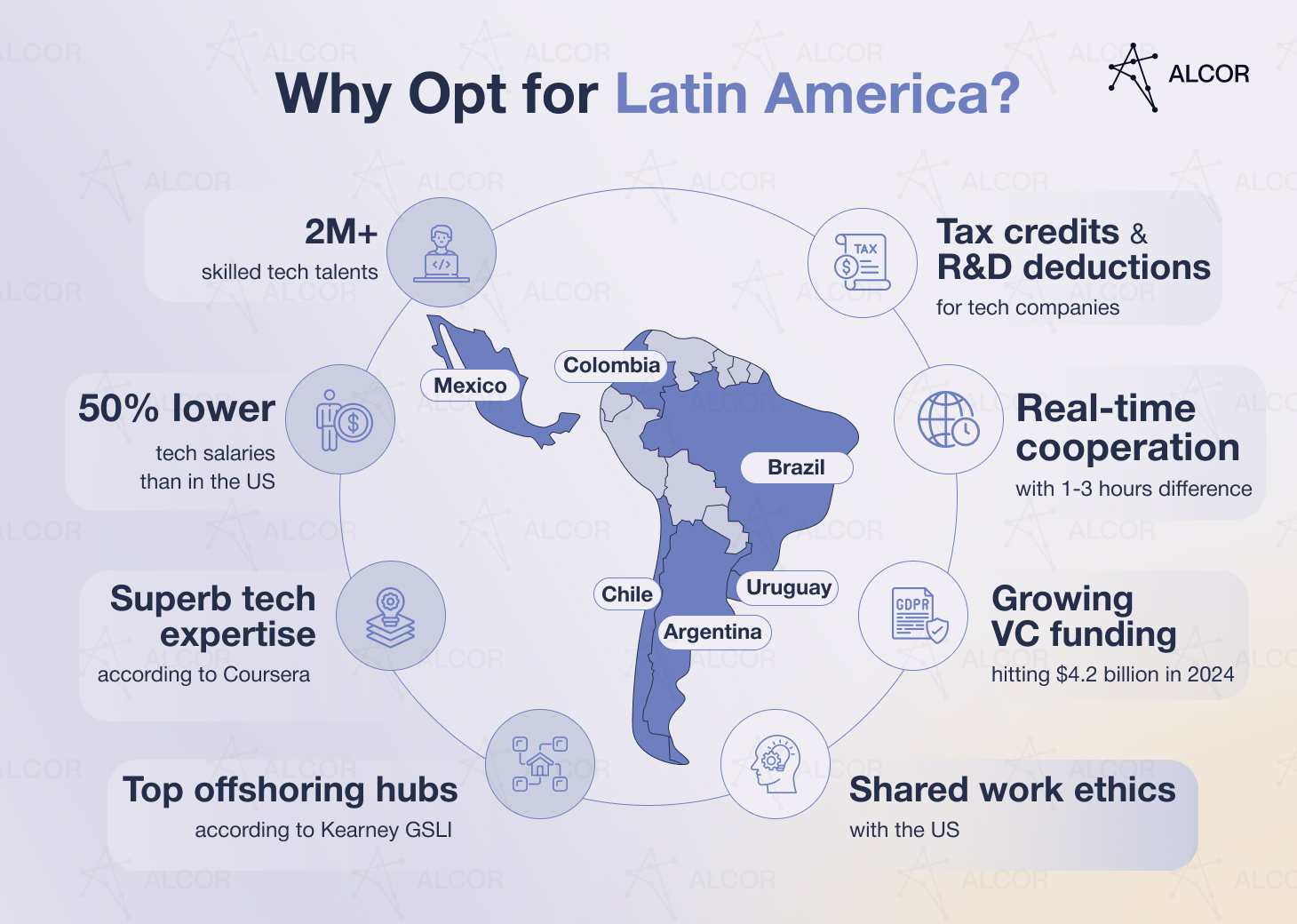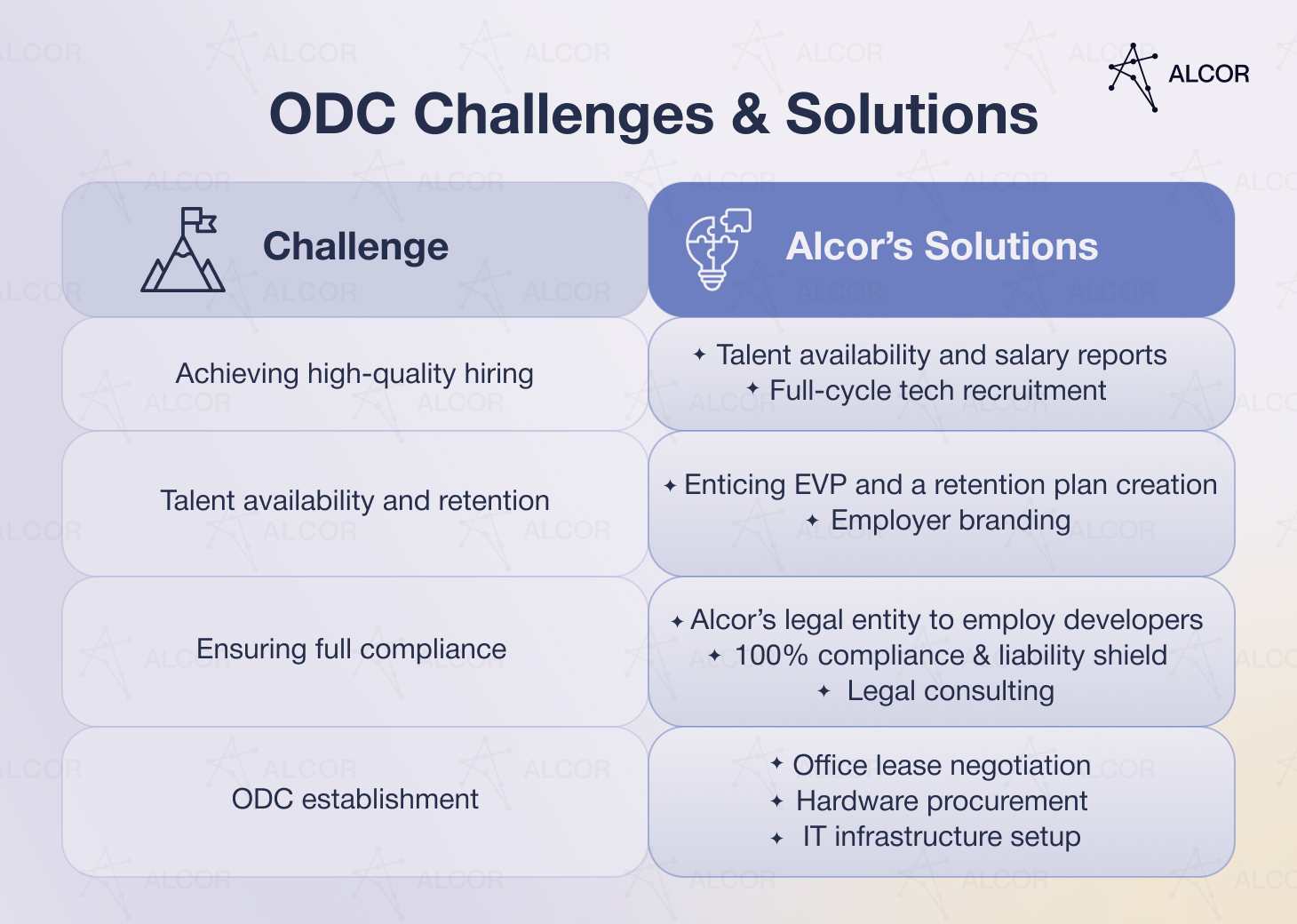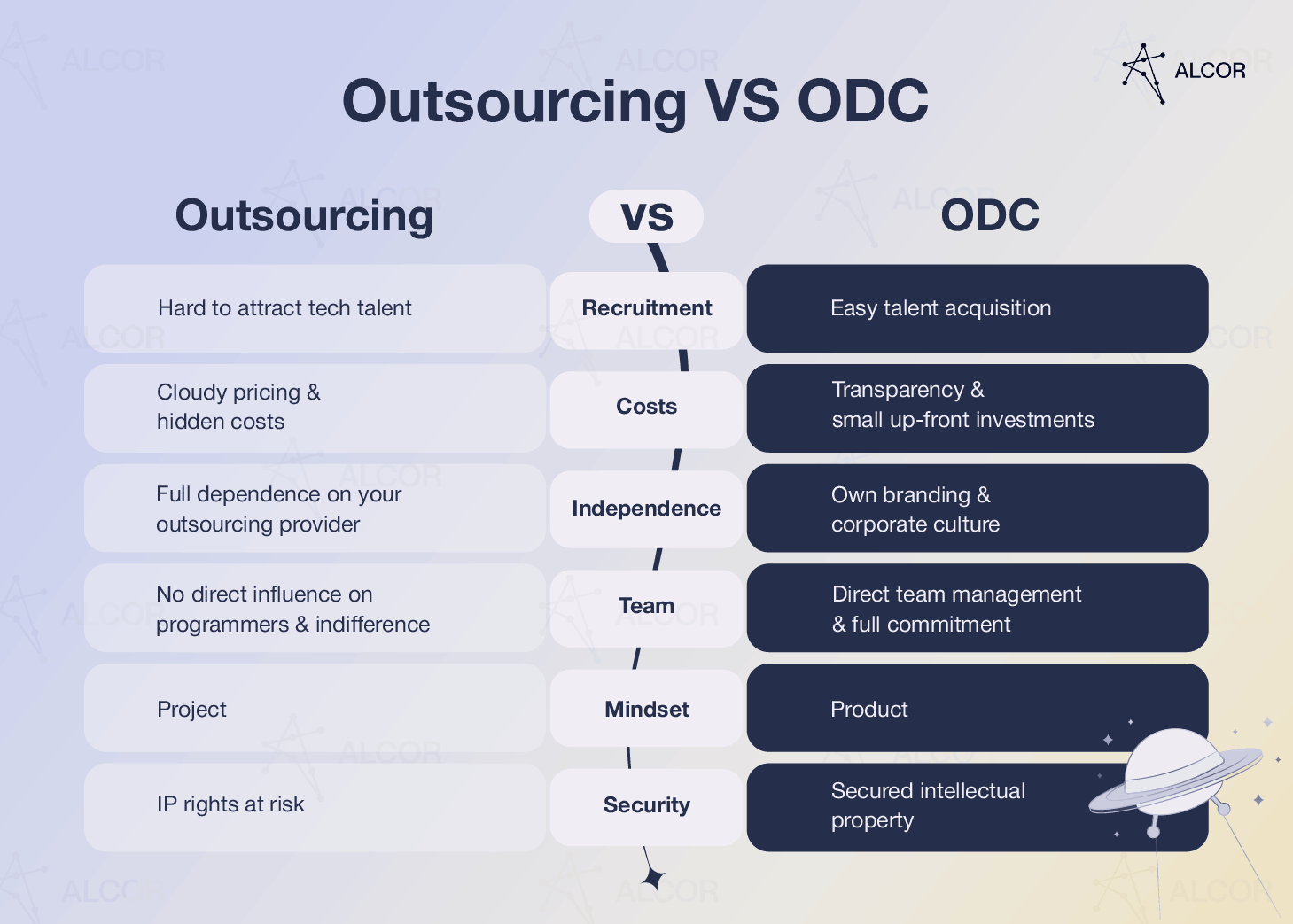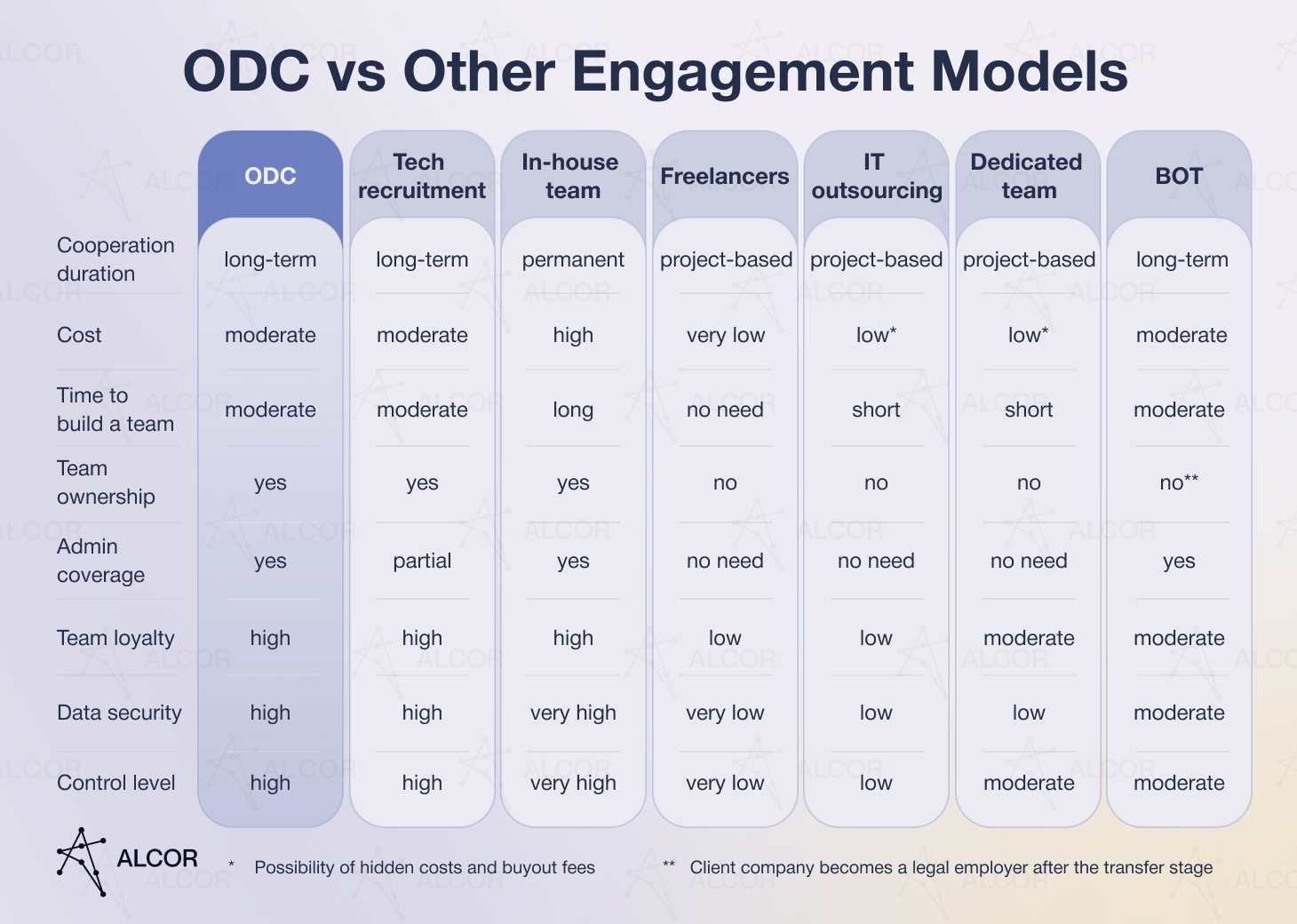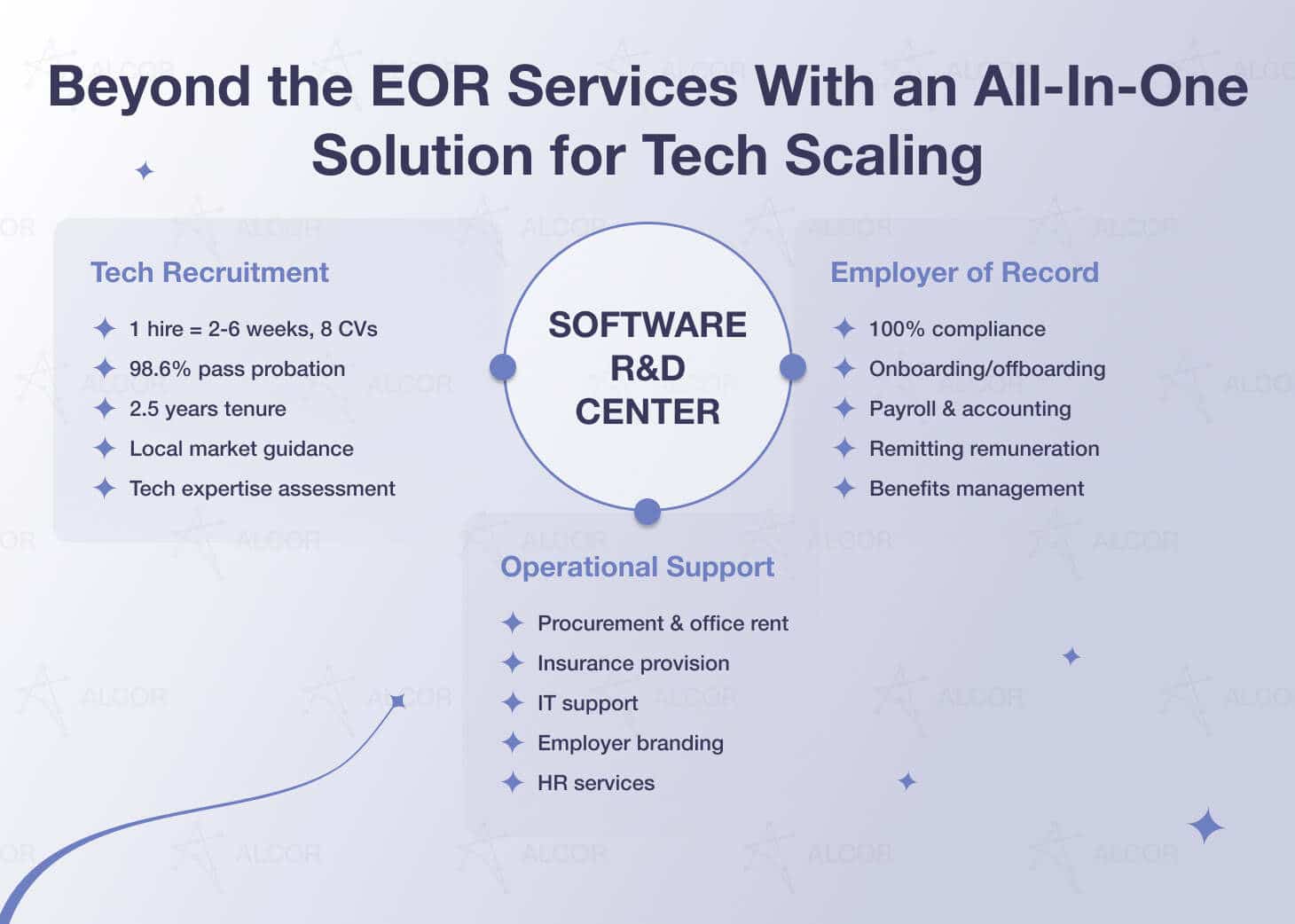An offshore development center (ODC) is a company’s branch with a team of software engineers located in a talent-rich yet cost-effective country. Also known as a global capability center and captive center, this model offers a strategic edge for tech businesses, aiming to scale smartly. With the offshore software development market size expected to hit $283 billion by 2031 at a robust 10.13% CAGR, it’s no surprise this model is a top pick among tech leaders eager to thrive in the innovation realm.
I’m Dmytro Ovcharenko, CEO at Alcor, where we fast-track tech product companies’ expansion with our 360° software R&D center solution. It’s a perfect mix of tech recruitment, Employer of Record, and operational support that results in swift team scaling—from 0 to 100 elite software engineers in a year, with no legal entity needed.

This article will help you decide if an offshore software center is the right fit for your business by showing how it stacks up against other cooperation models. You’ll gain a clear roadmap for setting up an offshore software center—its types, key benefits, and challenges (and how to sidestep them), as well as the best locations to expand. Buckle up, and let’s go!
How an Offshore Software Development Center Works
Let’s say your tech company has an ambitious goal to elevate software development. But scaling your team onshore, especially in the US, feels like an uphill battle because of high competition for talent and over-the-top costs. That’s where you can explore the offshore development center model as a viable solution for your tech business.
Basically, you’ll engage in three main stages to build an ODC:
1. Preparation
This is when all your research and consideration is done for setting up an offshore software center. You need to outline the scope of work that will be delegated to your future ODC team, identify required skills and qualifications, team composition, and development goals. The beneficial side of the offshore development center is its scalability. You can start with 5-10 software engineers and then broaden your team as your business grows.
You should also research and select the most optimal offshore location and find a reliable ODC service provider. Keep reading and you’ll find an offshore development center checklist to tick all the boxes of ODC establishment.
2. Setup
Depending on the type of offshore development center, you may need to open your legal entity abroad. You should also lease office space and establish secure IT infrastructure for your developers. Meanwhile, you also assemble a software development team and provide onboarding and training to your offshore programmers.
It’s worth mentioning that offshore development teams usually work under the same brand as their head office and follow mutual corporate policies, e.g., offshore tech specialists perform core tasks and bring the same value to the business as any other in-house team.
3. Development & operations
Here comes the active phase, where your ODC team dives into the software development process and brings the first results while you keep complete control over the team, development, and software quality assurance.
Operational functions such as payroll processing, tax coverage, and HR management can be either handled by your in-house team or delegated to the ODC service provider. Let’s have a look at the types of offshore development centers to understand the difference.
Contractor vs Customer ODC Model
Contractor Model
This type of offshore development center service is suitable for startups and SMBs. In fact, it can be better described as an outsourced development center since offshore programmers are not employed within the company and just take care of certain product development aspects. Thus, in-house product managers assign tasks to the ODC project manager, who then cooperates with the offshore development team and reports back to the main office.
Pros:
- Not employing programmers saves a buck or two on overhead labor costs;
- Depending on product development needs, various experts can be easily hired or replaced;
- Allows the company and its in-house team to shift their focus to more strategic functions.
Cons:
- Involves additional management, represented by an offshore project manager, which may result in vague communication and lack of clarity among offshore programmers;
- Frequent replacements of dedicated offshore developers dilute product understanding if not managed well.
Customer Model
Perfect for corporations, this type of offshore software center essentially means branching out into another location because an ODC acts as a subsidiary of the company. That’s to say, all offshore team players are employed full-time. However, it differs from a traditional branch since business operations take place overseas.
Onsite, there will be senior figures present to take care of management and decision-making, while all development-related services will be provided by an offshore team. It’s a highly efficient and popular model—for instance, Apple started launching its dedicated development centers 9 years ago, following such tech giants as Google, Microsoft, and Cognizant.
Pros:
- Provides you with a loyal team of developers who are fully integrated with your company culture;
- The process is managed by senior employees, so the offshore team will be immersed in the product;
- The customer model has proven to be efficient for key tech figures on the market, so it’s an approach that will provide long-term benefits.
Cons:
- High upfront investment is usually required, with expenses depending on the chosen location;
- More time and resources are needed to establish your legal presence abroad and manage all the operational functions.
As you can see, both types of the offshore software center have their pros and cons. So, we at Alcor devised an improved version of the classical ODC types. It allows you to remain the owner of the ODC while skipping the need to open a legal entity, retain full control over the team and development, and manage operational functions stress-free. Check out the table below and compare yourself!
Characteristics of an Offshore Software Development Center
Imagine you’ve decided to build your own software development center. How should you know whether your overseas unit is set right? Here are some of the key characteristics every successful ODC should have:
- Tech-reliable: provides a loyal team of software engineers focused on your product development;
- Scalable: allows you to adjust the offshore team according to product needs;
- Flexible: you are free to establish whichever software development methodology you want, be it Agile, Scrum, Waterfall, or Lean, and change it at any time, depending on your product development requirements;
- Company-tailored: you can opt for best practices or assemble only certain experts, customizing recruitment & onboarding;
- Secure: optimal for keeping your IP rights, signing NDAs, and maintaining company data inaccessible to non-employees;
- Helpful for company expansion: building up such an offshore center correlates with establishing your brand presence in the new market.
Benefits of an Offshore Development Center Model
Broader talent availability
I bet you’ve already faced a talent gap, or you’re starting to feel the need for more skilled talents for your product development. But if you’re doing business in the US, it’s undoubtedly a puzzle to find talented developers. The offshore software center comes in handy here.
It allows you to tap into markets with high talent availability and diverse skill stacks like Latin America or Eastern Europe. With the local ODC service provider, you can quickly close those pending vacancies and boost your software product development to new heights. This automatically translates into higher competitiveness and growing revenue.
Cost-effectiveness
With the median US software engineer salary of $130,750, hiring talents without breaking the bank sounds like the plot of a fantasy film nowadays. That’s why more and more tech companies are exploring cost-effective alternatives. For instance, by hiring software developers in Mexico, you can save a whopping 55% on labor expenses. But here is the trick: you need to choose the right cooperation model. While some tech executives experiment with outsourcing, others choose a smarter move of building their own ODC (which, by the way, costs 40% less).
That’s what a US-based company, Dotmatics, opted for when pursuing their business expansion in Eastern Europe. Just look at their stunning results:
Committed engineers
ODC’s advantages don’t end there! By using this cooperation model, you also get your own loyal team of software engineers. How does it work?
Instead of agreeing to the pre-selected developers of an outsourcing provider, you get verified CVs of top candidates from your local ODC partner. Next, you assess them, interview them, and decide on perfect fits—just like hiring in-house developers. Then, you work with them directly from day one, under your brand, culture, and practices. In turn, you receive a powerful commitment and willingness to walk an extra mile when working on your product development.
Secured IP rights
Having a software development team that acts as your in-house programmers automatically minimizes the possibility of data breaches. You see when working under the offshore development center model, you don’t share your IP with external parties, such as an outsourcing provider and their tech team. You don’t have to worry about them repurposing your unique code or practices somewhere else.
Instead, your trusted team is the only people who have access to the sensitive data. This diminishes risks for your IP rights thanks to authorized entry, data access control, and network security systems. Being an offshore branch of your office, an offshore delivery center doesn’t require additional security or compliance tracking.
Own branding
It’s vital for you, as a tech company executive, to enter a new market under your brand. Why? Because in this way, it’s easier for you to attract top-tier talent, preserve control, and even get investment.
Promoting your own brand in the offshoring location is like opening a jar of honey in front of bees. Software developers love working for tech companies with innovative products, so your chances of filling positions will skyrocket.
Then, having your own ODC team of developers will allow you to stay in the driver’s seat—you’ll be the only one managing the team, software development, and expenses. This means clear communication, high-quality results, and transparency. And the icing on the cake is the possibility to secure investment or go public. Investors love cutting-edge products behind which stand A-player teams.
Indicators to Set up an Offshore Development Center
You’re probably wondering if your tech business is actually ready for expansion with an ODC. Let’s look at some key indicators that might signal so.
-
You Need to Scale Your Team
A dedicated offshore development center is an attractive opportunity for already established tech companies seeking effective ways to scale up their team. With limited resources available in one place, it’s difficult to expand development teams into new markets. For these reasons, some global technology businesses like Grammarly and BigCommerce established their ODCs with the help of a local provider. As a result, it helped them boost software product delivery and enlarge in-house capacities. For example, BigCommerce successfully went public with their Eastern European ODC team in 2020.
-
You Require Rare Talents
If you’re a startup that develops an innovative product, you may require engineers with niche skills. Since finding brilliant experts onshore is challenging, it’s more beneficial to look for dedicated offshore software developers. This decision leads to accessing global talent and finding the best of the best. Among other examples of offshore outsourcing are world-renowned startups People.ai, Ring, and ThredUP, which expanded into Eastern Europe for offshore coding because of the competent software engineers they hadn’t been able to find anywhere else.
-
You Need to Lower Your Operational Costs
The truth is that, nowadays, software developers are some of the most highly-paid specialists in the world. Due to this, when employing engineers in the US, you can simply drain your wallet. Thankfully, the offshore development services industry is famous for its budget-friendliness, so you save money by hiring lower-paid software engineers. Additionally, you can significantly reduce your operational expenses, such as technical equipment, office lease, facilities, and maintenance, because of the generally lower prices and rental fees. After that, you get the ability to reinvest the savings for current business needs.
-
You Want to Focus on Your Product
Among other benefits of an offshore software center is the possibility of concentrating on core business tasks. Accordingly, this model works as a means to reduce your everyday stresses and enhance productivity. Just imagine: mundane operations such as tech recruitment, payroll, and accounting are managed by a professional ODC service provider overseas. At the same time, you take care of the company’s growth by managing your team of offshore developers independently.
Offshore Development Center Setup Checklist
Once you decide to start offshore software development, you have to think over the smallest details and embrace the best practices to reach your goals. Here are the seven points that make the core of your offshore development center checklist.
- Decide on an offshoring destination. Apart from lower operational and labor costs, businesses should also pay attention to the technical skills and cultural specifics of different nations. An offshoring team with opposite values can result in multiple misunderstandings and conflicts.
- Pay attention to the remoteness of the country. Distant locations might be an obstacle if you plan to conduct face-to-face meetings frequently. On top of that, it could be challenging to control the daily activities of your colleagues and synchronize with them due to different time zones.
- Research the offshore tech markets. Find out if there are any conferences and events for the IT community, which companies have already entered that market, and whether the government provides any type of support for them.
- Decide on an offshore-based partner. Choose a partner that builds ODCs exclusively for tech companies and focuses on the legal employment of software developers. Typically, such providers know all the ins and outs of tech expansion and will launch your ODC in a couple of months. It’s always a good idea to research their case studies, pricing, and reviews on independent platforms like Clutch.
- Identify the provider’s scope of services. Ideally, you want a partner who has a broad spectrum of services so you can avoid juggling multiple vendors. Make sure your ODC service provider offers tech recruitment, Employer of Record services, and back-office support—a turnkey solution for a fast and smooth expansion.
- Verify tech recruitment expertise. You can request detailed information about the guarantees and commitments of their recruitment team and even ask for references. Don’t hesitate to clarify the time it takes to close your vacancies and the hiring strategy and process before beginning the partnership.
- Ensure you have the right idea about your cooperation model. To avoid further misunderstandings, it’s better to make sure you will be involved in the process of recruitment, team management, or salary negotiations.
Choosing a Destination for an Offshore Software Development Center
Latin America
The number one nearshoring region for US-based tech companies, LATAM offers the best of both worlds: a talent pool of 2+ million skilled developers and rates 50% lower than those in the US. No wonder 75% of the US companies have considered hiring talent from this vibrant region. With fintech, AI, cloud computing, and e-commerce advancing at light speed, international companies in these sectors stand to gain the most by expanding to LATAM. Here is a sneak peek into its most prominent tech hubs for your consideration:
Mexico
- ICT market revenue: 17.8 billion
- Tech talent pool: 800,000+
- Senior developer salary: $57,600
- Tech skills: #3 in LATAM
- Specialization: mobile app development, cloud solutions, web development
- Tech hubs: Mexico City, Monterrey, Guadalajara, Mérida
- Business environment: A4, from 56% to 89% deductions for R&D companies
- Innovation Index: #3 in LATAM, with high creative and tech outputs
- Real-time cooperation: 1-hour difference with the US West Coast and 2 hours with the East Coast
Colombia
- ICT market revenue: 2.05 billion
- Tech talent pool: 150,000+
- Senior developer salary: $54,700
- Tech skills: #5 in LATAM
- Specialization: mobile app development, custom software solutions, cloud technologies
- Tech hubs: Bogotá, Medellín, Cali
- Business environment: A4; 30% tax credit for R&D investmentsInnovation Index: #4 in LATAM, with good business sophistication and developed infrastructure
- Real-time cooperation: 1-hour difference with the US East Coast and 2 hours with the West Coast
Argentina
- ICT market revenue: 3.1 billion
- Tech talent pool: 115,000+
- Senior developer salary: $53,500
- Tech skills: #8 in LATAM
- Specialization: mobile development, data analytics, and computer programming
- Tech hubs: Buenos Aires, Córdoba, Mendoza
- Business environment: B; Tax Credit Voucher for tech companies
- Innovation Index: #8 in LATAM, with high creative outputs and human capital
- Real-time cooperation: 2-hour difference with the US East Coast
Chile
- ICT market revenue: 2.07 billion
- Tech talent pool: 61,000+
- Senior developer salary: $54,500
- Tech skills: #4 in LATAM
- Specialization: web development, big data, cloud solutions
- Tech hubs: Santiago, Valparaíso, and Concepción
- Business environment: A3, with tax credits and R&D deductions
- Innovation Index: #2 in LATAM, with high market sophistication and number of institutions
- Real-time cooperation: 2-hour difference with the US East Coast
Brazil
- ICT market revenue: 22.4 billion
- Tech talent pool: 630,000+
- Senior developer salary: $62,500
- Tech skills: #2 in LATAM
- Specialization: data science, mobile development, software engineering
- Tech hubs: São Paulo, Rio de Janeiro, Curitiba, Belo Horizonte
- Business environment: A4; deduction of R&D expenses from taxable income
- Innovation Index: #1 in LATAM, with good business sophistication and creative outputs
- Real-time cooperation: 2-hour difference with the US West Coast
Uruguay
- ICT market revenue: $795 million
- Tech talent pool: 33,000+
- Senior developer salary: $52,000
- Tech skills: #1 in LATAM
- Specialization: data analytics, statistical programming, mobile development
- Tech hubs: Montevideo
- Business environment: A3; 35% credit for R&D expenses
- Innovation Index: #5 in LATAM, with developed infrastructure
- Real-time cooperation: 2-hour difference with the US West Coast
Eastern Europe
With a pool of 1,7+ million tech talents skilled in both tech skills and data science, along with exceptional English proficiency, Eastern Europe is a magnet for international tech companies. Big names like Google, Microsoft, Oracle, and Cisco already have their ODCs in this offshoring region. And the momentum doesn’t stop—SAP is set to open its digital innovation hub in Romania, while Intel is investing $4.6 billion into its digital innovation hub in Poland. But why do so many tech companies choose to create an offshore development center here? Let’s look at the stats!
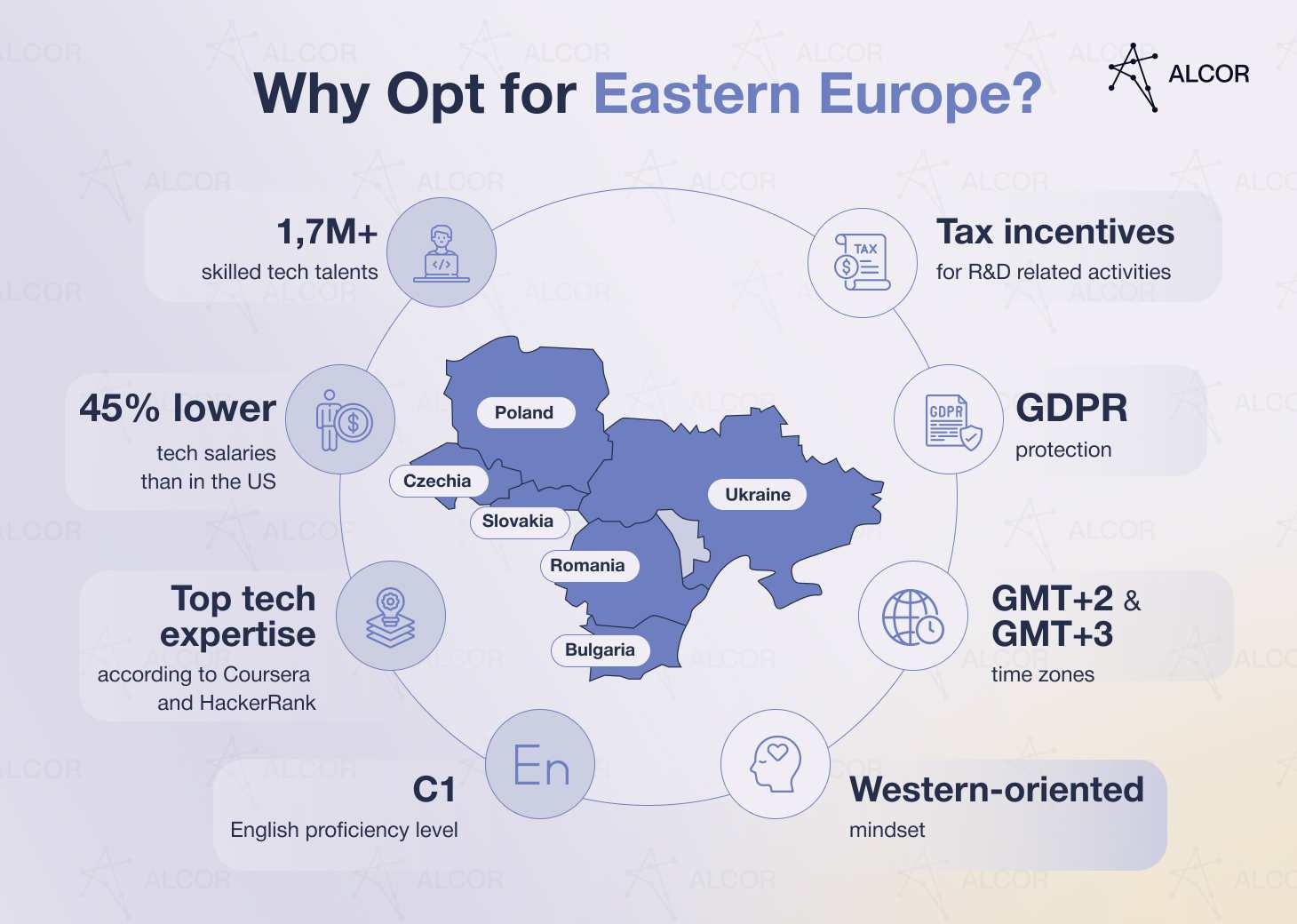
- ICT market revenue: 10.4 billion
- Tech talent pool: 650,000+
- Senior developer salary: $75,600
- Tech skills: #1 in CEE
- Specialization: web development, game development, and enterprise software
- English proficiency: #2 in CEE
- Tech hubs: Warsaw, Krakow, Wroclaw, Poznan, Lodz, Tri-city
- Business environment: A2, deduction of 200% of R&D costs
- Innovation Index: #4 in CEE, with high human capital and tech outputs
Romania
- ICT market revenue: 1.3 billion
- Tech talent pool: 250,000+
- Senior developer salary: $72,000
- Tech skills: #7 in CEE
- Specialization: web development, mobile app development, and cloud computing
- English proficiency: #1 in CEE
- Tech hubs: Bucharest, Cluj-Napoca, Iasi
- Business environment: A3, companies engaged in R&D are exempt from profit tax for the first 10 years
- Innovation Index: #6 in CEE, with high-tech outputs and developed infrastructure
Ukraine
- ICT market revenue: 3.6 billion
- Tech talent pool: 346,000+
- Senior developer salary: $63,000
- Tech skills: #5 in CEE
- Specialization: web development, mobile app development, and AI development
- English proficiency: #7 in CEE
- Tech hubs: Kyiv, Lviv, Odesa, Dnipro, Kharkiv
- Business environment: C, favorable tax rates under Diia.City
- Innovation Index: #7 in CEE, with high-tech outputs and human capital
Bulgaria
- ICT market revenue: $463.3 million
- Tech talent pool: 126,000+
- Senior developer salary: $65,000
- Tech skills: #4 in CEE
- Specialization: web development, cloud computing, big data development
- English proficiency: #3 in CEE
- Tech hubs: Sofia, Burgas, Plovdiv
- Business environment: A3, EU-lowest PIT and CIT (10%)
- Innovation Index: #3 in CEE, with high creative outputs and developed infrastructure
Czech Republic
- Tech talent pool: 221,000+
- Senior developer salary: $71,500
- Tech skills: #2 and in CEE
- Specialization: computer networking, mobile development, programming
- English proficiency: #6 in CEE
- Tech hubs: Prague, Brno, Ostrava
- Business environment: A2, deduction of 100% on eligible R&D expenses
- Innovation Index: #1 in CEE, with high knowledge and technology outputs
Slovakia
- Tech talent pool: 61,000+
- Senior developer salary: $62,500
- Tech skills: #4 in CEE
- Specialization: mobile app development, cloud computing, game development
- English proficiency: #5 in CEE
- Tech hubs: Bratislava, Košice, Trnava
- Business environment: A2, deduction of 200% on eligible R&D expenses
- Innovation Index: #5 in Europe, with high knowledge and technology outputs
Sources: Statista, Coursera Global Skills Report 2024, English Proficiency Index 2024, Coface, Global Innovation Index
Challenges When Starting a Dedicated Offshore Development Center
Ensuring high-quality hiring
While offshoring gives you access to a vast talent pool, it also brings hiring challenges. It might be hard to navigate in a new location, as labor markets and rules differ from one country to another. As a result, you may face a long time filling tech positions, consequently delaying your ODC launch and slowing down your expansion plans.
Solution:
If you’re eyeing Eastern Europe or Latin America for business scaling, Alcor has you covered with full-cycle tech recruitment. From candidate profile creation to sourcing, pre-screening, and interviewing, we handle it all with the highest performance standards. Our CV pass rate is 80% which means 4 out of 5 of our candidates land jobs at our client companies while 98.6% of our hires pass probation.
Check how Alcor hired 5 top Full-Stack Engineers and a Product Manager in 6 weeks for Gotransverse.
Talent Attraction & Retention
Finding and then retaining top talent in an unfamiliar market is not a walk in the park for tech companies. Not only may your ideal candidate not be aware of your brand, but also be discouraged from sending their CV because of the ill-crafted EVP. Even the smallest contract aspect, like an uncompetitive salary, limited social package, or ambiguous approach to days off or sick leaves, can stop them from becoming a part of your ODC.
Solution:
Local talent acquisition specialists make all the difference. For instance, Alcor’s tech recruiters know LATAM and EE markets inside out and can help you craft and promote compelling EVP and advise you on retention best practices. Coupled with employer reputation management from our marketing team, we will close your tech positions in 2-6 weeks.
Staying Compliant
Every offshoring location has its own legal peculiarities. Navigating local labor laws, employment contracts, tax regulations, and compliance requirements can be a real headache. The situation becomes even more complex if you need to open a legal entity to employ offshore software developers.
Solution:
Cooperate with an ODC service provider who offers Employer of Record for technology and has a legal entity in the location of your expansion. For instance, Alcor is legally present in LATAM and Eastern Europe. Plus, our lawyers are savvy in international law, labor laws, employment contract types, taxation, and GDPR, ensuring full compliance with your local and foreign regulations when using GCC as a service.
Setup Complexities
When expanding to the offshoring destination, you should also be ready to cover operational functions to open an ODC. Among the essentials are negotiation of office leasing, hardware procurement management, and IT infrastructure setup. All of this requires additional time and resources, not to mention possible challenges. Take, for instance, office leasing. You would need to research the local real estate market, analyze rental costs, study commercial lease structure, and negotiate office leasing. Sounds like a lot, doesn’t it?
Solution:
You can handle a global in-house center setup seamlessly with a local service provider like Alcor. We handle all possible operational functions, from office search and lease negotiations to procurement and IT infrastructure, so you can focus on growing your business with peace of mind.
Mistakes in Setting Up an Offshore Software Development Center
In order to make your expansion smoother, I suggest avoiding these key mistakes when launching the offshore software center:
#1. Involve multiple service providers
Setting up an ODC in an unfamiliar market can be overwhelming—there’s legal entity registration, hiring developers, payroll processing, office leasing, and the list goes on. Many tech companies turn to local service providers for help. While it can lift some burden off your shoulders, juggling multiple vendors can also create a lot of headaches. You would have to coordinate communication, track progress, and piece everything together while minimizing errors. Not to mention the risks of sensitive data leaks and missed deadlines.
#2. Ignore employer branding
Some business leaders don’t promote their company while entering the new job market and often end up with offer rejections from candidates. The best way to avoid this issue and accelerate recruitment is to start an employer branding campaign. If you advertise your company as a nice place to work, it’ll attract more tech talents. The key point is to understand that offshoring employer brand campaigns must be tailored to the targeted tech community.
#3. Neglect office location details
A huge working area or a fascinating panorama shouldn’t throw dust in your eyes. There are so many things that tech executives overlook before the deal, e.g. soundproofing, air conditioning, electrical systems, utility connections, and 24/7 access. Renovation issues and hidden malfunctions can disrupt your ODC’s operations and lead to costly surprises in the long run. On top of that, poorly negotiated termination terms may drain your budget even more! Work with a real estate agent and commercial lawyers to set up your dedicated development center risk-free.
#4. Unadaptable company policies
Your corporate HR policies may work well for in-house teams, but your dedicated offshore developers are located in another country with their own national holidays and labor laws. For this reason, be adaptable and discuss the vacation & day-off opportunities with the offshoring team individually.
#5. No IP rights agreement
Although you hire a trustworthy team of developers, a non-disclosure agreement is signed by default. Companies that produce intellectual property must keep an eye on their legal rights from the very beginning. Consult IT lawyers to prepare a comprehensive agreement to prevent the leakage of your confidential information.
#6. Direct income
The type of employment contract influences other legal procedures, including opening visas. When a developer is your contractor from another country and receives income directly from the head office, they will hardly get a business or travel visa to America because of the tight regulations in the US embassy. Try using ODC or GCC as a service to explore ways of dealing with this issue.
Risks of Managing an Offshore Development Center
Although there are enough benefits, tech companies need to consider important aspects of setting up an offshore research and development center. This includes hidden pitfalls that are difficult to foresee but easy to prevent in the right hands.
1. Scattered services
2. Drawn-out recruitment
3. Vague pricing
There are few service providers that offer turnkey services for building offshore development centers. This would force you to consult a bunch of law firms, accounting specialists, and financial consultants who will give contradictory opinions. Avoid this by finding a service provider with full expertise in operational management. You’ll have access to different specialists who will come up with a single one-stop-shop solution that is most suitable for your business.
Sometimes, country managers of offshore development centers struggle to hire IT specialists quickly. This may relate to a scant understanding of the local market or ineffective recruitment services from your vendor. A competent recruitment agency with defined KPIs, commitments, and guarantees will reduce the risks and speed up your hiring.
To make your offshore development cost-effective enough, make sure you use a flexible pricing model. This should include the possibility of picking up the necessary services and paying only for those you use. If your invoice doesn’t contain detailed information about the costs, change your offshore IT services provider.
ODC vs IT Outsourcing
The offshore development center model is often contrasted with IT outsourcing. These are two polar business models used by tech companies when moving offshore. Some of the key differences are the following:
Mindset
Passionate software engineers tend to work for product companies. Compared to outsourcing, offshore development centers give developers the opportunity to become part of the IT product. This attracts talented IT specialists with a product mindset who are ready to bring more commitment to their work.
Costs
While code outsourcing may seem cost-effective initially, it often leads to massive overspending in the long run, reaching tens of thousands of dollars of buyout fees for one software developer. That’s why, for long-term cooperation, your own offshore software center can be a game-changer.
Offshore product development offices require some upfront investment, mainly in tech recruitment and Employer of Record services if you cooperate with developers on an employment contract basis. But in the long run, they show a high return on investments. Plus, with an ODC, you get pricing transparency, something that’s hard to come by with outsourcing providers.
Team management
Outsourced development teams are supervised by project managers from your service provider. Consequently, as a customer, you don’t have any direct influence on the team. An outsourcing firm retains its rights to shuffle team members and assigns them to different projects. Unlike this, with an offshore development center, you are the one and only employer for the team.
Talents
Professional software engineers are eager to work on one product since they are not interested in “spreading themselves out” through different projects with a similar scope of work. Talented developers see many career prospects in a product company. They realize the opportunity to enhance tech competence and exchange their experience with foreign tech-savvy specialists.
ODC vs Other Engagement Models
With software outsourcing being the most common, there are more engagement models that I’m going to compare: IT recruitment, building an in-house team, working with freelancers, IT outsourcing, building a dedicated team, opting for a build-operate-transfer model, and offshore product development. Tech companies apply them all but receive different results.
IT recruitment refers to hiring top-notch software development experts via a staffing agency. The hiring provider has their own talent network, access to local tech communities, and experience in employer branding. Via this model, you still participate in the decision-making process and final interviews, but everything prior is left to the provider’s tech recruiters so you can focus on more critical tasks. Additionally, the firm can consult you on payroll & legal compliance. Upon request, some tech recruitment partners (Alcor included) can help you establish an offshore IT development center similar to an ODC.
An in-house team is the core of your company and its main asset in product development. It’s a long-term cooperation with programmers who feel part of the product and are willing to contribute their best skills. On the flip side, recruiting in-house software engineers can be time-consuming and costly, so it’s not the ideal solution for fast growth and market expansion (unless you have the money and time to invest).
Cooperation with freelancers implies delegating some tasks to freelance specialists on Upwork, Fiverr or other websites. The benefits of this solution include a large number of freelancers available and convenient payment since the client pays only when fully satisfied with the outcome. However, it proves difficult to select candidates due to a limited number of interview rounds. All in all, such cooperation cannot cover product development but is rather a short-term solution for specific tasks.
IT outsourcing is about passing product development or part of it to an external software development provider. It’s a good solution if your company is not tech-oriented to begin with but needs a website or an application for your services. IT outsourcing is quick and cheap, but the main pitfall is indirect communication with the team via the provider, which makes the final outcome hard to define and agree upon. Besides, the IP rights for the product belong to an outsourcing team, and the process of transferring them to you can be lengthy and complicated. If you have a tech product company, a more viable solution is hiring an in-house team, which you can do via IT recruitment or an ODC model.
A dedicated team or IT staff augmentation is used when a product company feels reassured of the quality and economy of doing business in the chosen offshoring country. The company hires dedicated offshore developers from outstaffing agencies, having direct access to engineers for a limited period of time.
Build-operate-transfer (BOT) is a more profound solution that is similar to the offshore software development model. It suggests contracting with a local vendor who will build, operate, and then transfer a software development center to you. In its final stage, however, BOT has many risks regarding knowledge and people transfer.
An Offshore Development Center (ODC) is the model which leaves much room for independence and flexibility. You can upgrade your business from any stage to open your own offshore development office. The biggest bottleneck is operational management, but with a reliable partner, you can get rid of it to focus on your IT product instead.
Start an Offshore Software Development Center with Alcor
As you can see, an offshore development center is a perfect solution for tech companies seeking ways to expand abroad. As an alternative to traditional outsourcing and other cooperation models, an ODC provides you with a loyal team, strong security, and freedom to control all business processes.
Build your own offshore software R&D center in Latin America or Eastern Europe with Alcor. We provide a holistic approach that eliminates all the expansion hassle while allowing you to focus on software development and business growth. Here is how it works:
- Start recruitment
We have 40+ software development recruiters and researchers who will select eligible candidates for your future ODC. Expect to receive verified CVs tailored to your requirements and needs within a swift 5-day turnaround. Remarkably, 4 out of 5 of our candidates are typically invited for an interview, showcasing the precision of our selection process. Meanwhile, our recruiters need only 2-6 weeks to close a senior, lead, or C-level position.
- Get legal support
Our team of experienced lawyers is ready to navigate you through the legal intricacies in one of the Latin American or Eastern European markets. Our comprehensive legal and compliance services include tax planning, real estate negotiations, signing agreements, such as SLAs, NDAs, or B2B contracts, consultations on labor laws, and M&A support. Our team will also help you choose the most optimal employment model and help you employ new hires via one of our legal entities.
- Find an office
While recruiters at Alcor are hunting tech talents for your offshore software center, our real estate managers will start the search for an office space where the future team will work. We’ll advise you on the location and rental costs and negotiate the best conditions for you during office leasing in Eastern Europe or Latin America.
- Make procurements
To equip the new office, we can help you choose furniture and establish a proper IT infrastructure. It includes computers, software, security systems, servers, and inner correspondence service—everything for the successful establishment of an offshore software development company.
- Recruit people
This is the stage when you’ve selected the right developers, and we’re ready to make job offers. Notably, an impressive 98.6% of our candidates pass the probation, while, on average, they contribute their skills and expertise for 2.5 years to our clients. As your first employees commence their work, your offshore development company is officially up and running!
- Organize HR payroll
Accounting and offshoring payroll services are important parts of operational management to support the functioning of your new software center overseas. Our EOR service handles salary payments, money transfers between your offshore product research and development unit and head office, as well as health insurance and leaves.
All of this is followed by further operational management support, including additional services like business travel support, employer branding, stock option planning, and work permits for foreigners.
96% of our clients are WOWed by our turnkey solution. Just look at People.ai. This US-based tech company expanded into Eastern Europe within just 1 month via our R&D center solution. We launched a fully backed office, hired 25+ software developers, and ensured 100% compliance and operational support.
Let’s make your expansion just as successful!

